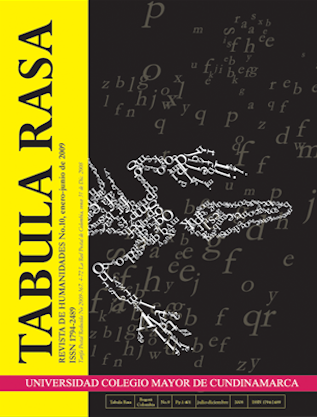¿Es factible el progreso social cuando diez menos uno es igual a cero?
Is social progression achievable when one from ten leaves naught?
Mostrar biografía de los autores
Este artículo analiza las opiniones de dieciséis académicos caribeños sobre el progreso social y concluye que tal cosa es en realidad inalcanzable en el Caribe, donde las metanarrativas diezman las masas y mantienen las posiciones de poder de unas pocas elites. En vista de esto, un paso importante hacia el avance social en el Caribe sería la evisceración de las metanarrativas europeas atrincheradas.
Visitas del artículo 144 | Visitas PDF 45
Descargas
Alpert, Harry. 1939. Emile Durkheim and His Sociology. Nueva York: Columbia University Press.
Altbach, Phillip. 2007. “The Imperial Tongue: English as the Dominating Academic Language”. International Higher Education. No. 49, Otoño.
Bernal, Martin. 2006. Black Athena: The Afroasiatic Roots of Classical Civilization. Rutgers University Press.
Braithwaite, Lloyd. 1953. “Social Stratification in Trinidad: A preliminary Analysis”. Social And Economic Studies 2. Nos. 2 &3 (Octubre).
Cooley, Charles Horton. 1926. “The Roots of Social Knowledge”. Amer. F. Social., vol. 32 (julio, 1926), pp. 59-79.
Chevannes, Barry. 2007. Betwix and Between. Kingston, Jamaica: Ian Randall Press.
Dupuy, Alex. 2001. “The New World Order, Globalization and Caribbean Politics. Meeks, Brian, Folke Lindahl New Caribbean Thought: A Reader. Kingston, Jamaica: University of the West Indies Press.
Figuerra, Darius. 2004. “Exiting a Racist Worldview. A Journey through Marx, Said and Foucault to Liberation”.
Graham, Otis. 1999. Our Kind of People: Inside America’s Black Upper Class. Nueva York: Harper Collins.
Henry Paget. 2000. Caliban’s Reason. Nueva York: Routledge Press.
Hoffheimer, Michael. 2005. “Race and Law in Hegel’s Philosophy of Religion”. Andrew Valls (ed.) Race and Racism in Modern Philosophy, Ithaca, Nueva York. Cornell University Press.
Lee Freese y Jane Sell. 1980. “Constructing Axiomatic Theories in Sociology”, Part I: 263-310. En: Lee Freese (ed.). Theoretical Methods in Sociology: Seven Essays, Pittsburgh: The University of Pittsburgh Press, pp. 263-310.
Lewis, Linden. 2001. “The Contestation of Race in Barbadian Society and the Camouflage of Conservatism”. En: Meeks, Brian, Folke Lindahl (editors). New Caribbean Thought: A Reader. Kingston, Jamaica: University of the West Indies Press.
Lee Freese y Jane Sell. 1980. “Constructing Axiomatic Theories in Sociology”, Part II. En: Lee Freese (ed.). Theoretical Methods in Sociology: Seven Essays, Pittsburgh: The University of Pittsburgh Press, pp. 310-368.
Miller. Michael. 2007. Reshaping the Contextual Vision in Caribbean Theology: Theoretical Foundations for Theology which is Contextual, Pluralistic, and Dialectical. MD: University Press of America.
Mead, George. 1938. The Philosophy of the Act (ed.) Charles W. Morris. Chicago: The University of Chicago Press.
Mbiti, John N. 1970. African Religions and Philosophy. Nueva York: Doubleday.
Merton, Robert, K. 1967. “Sociology as Multi-paradigmatic”. En: On Theoretical Sociology. Nueva York: Free Press.
Mills, Charles. 1997. The Racial Contract. Ithaca: Cornell Press.
Mills, Charles. 1998. “Dark Ontologies: Blacks, Jews, and White Supremacy”. En: Jane Kneller y Sidney Axinn (eds). Kant and Contemporary Social Issues Albany: University of New York Press, Nueva York.
Mills, Charles. 2001. “Revisionist Ontologies: Theorizing White Supremacy”. Meeks, Brian, Folke Lindahl New Caribbean Thought: A Reader. Kingston, Jamaica: University of the West Indies Press.
Mills, C, Wright. 1956. The Power Elites. New York Oxford University Press.
Moskos, Charles C. Jr. y Wendell Bell. 1964. “emergent Caribbean nations Face the Emergent Caribbean Nations Face the Outside World.” Social Problems, Vol. 12, No. 1, (Verano, 1964), pp. 24-41.
Nettleford Rex. 1993. Inward stretching, Outward Reaching: A Voice From The Caribbean. Londres: Macmillan Caribbean.
Olwig, Karen Fog. 1993. Global Culture Island Identity: Continuity and Change in the AfroCaribbean Community of Nevis. Philadelphia, PA: Harwood Academic Publishers. hillips, Mike y Trevor Phillips. 1998. Windrush: The Irresistible Rise of Multi-Racial Britian. Londres, Inglaterra: Harper Collins Publishers.
Rose, Gillian. 1981. Hegel Contra Sociology. Londres: Athelone y Atlantic High-lands, NJ: Humanities.
Scott, David. 2001. “The Government and Freedom”. Meeks, Brian, Folke Lindahl New Caribbean Thought: A Reader. Kingston, Jamaica: University of the West Indies Press.
Peterson, Richard. 2005. “Marx, Race, and the Political Problem of Identity”. En: Andrew Valls (ed.). Race and Racism in Modern Philosophy. Ithaca, Nueva York: Cornell University Press.
Sankeralli, Burton. 2003. “Of Creoles and Creolization,” www.trinidad-tobago.net/Article.
aspx, 4 de mayo, 2003.
Simey, T.S. 1946. Welfare and Planning in the West Indies. Clarendon Press: Oxford. Clarendon Press: Oxford.
Van Den Berghe, Pierre. 1978. Race and Racism. Nueva York: Wiley.
Walcott, Dereck. 1992. “The sight of History”. The New York Times. 8 de diciembre, 1992.
Wynter, Sylvia. 1996. “Is Development a Purely Empirical Concept or Also Teleo logical”. En A. Y. Yansane (ed.). The Prospects For Recovery and Sustainable Development in Africa. West Port Connecticut: Greenwood Press.




